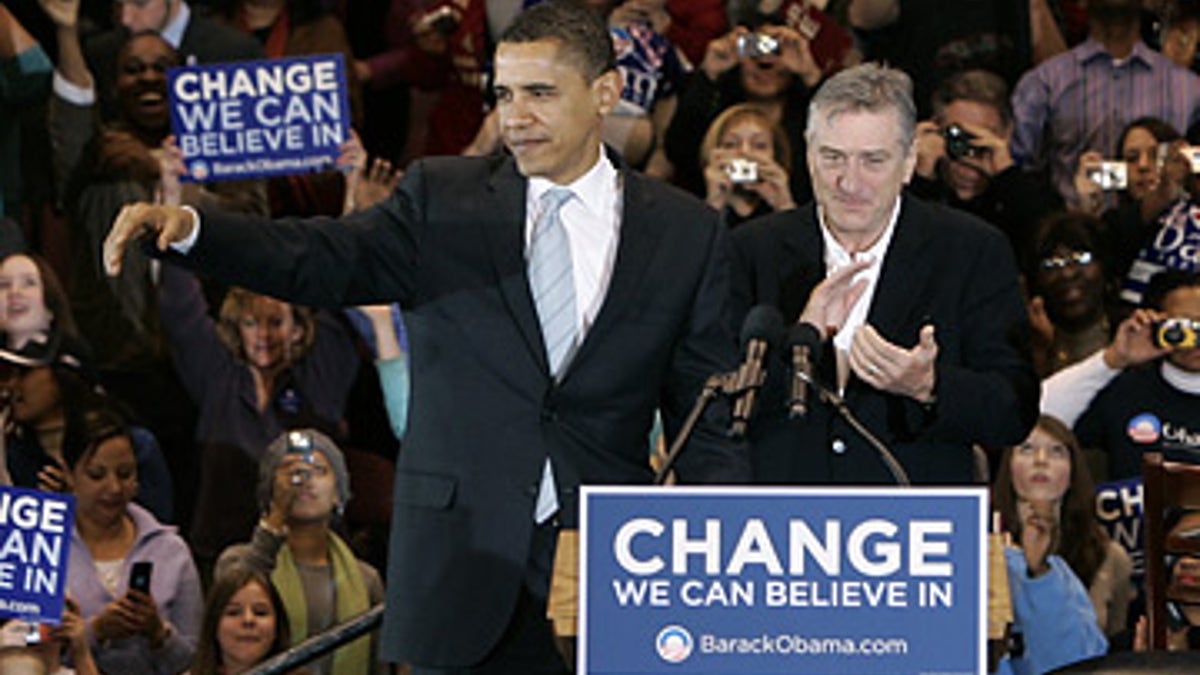
Then Sen. Barack Obama campaigns with Robert DeNiro in New Jersey on Feb. 4, 2008. (AP)
You can practically hear the crickets in Hollywood.
Compared to the presidential election of 2008, when celebrities from Oprah Winfrey to Ben Affleck to Robert DeNiro went all out for Barack Obama, the stars are staying home during the 2010 midterm election push, experts say.
“There is definitely an enthusiasm gap among celebrities this election cycle," Matthew Vadum, senior editor at the Capital Research Center in Washington, D.C., told Pop Tarts. Now that there is no George W. Bush to demonize, it is hard for most celebrities to get excited about the off-year congressional election."
Or maybe the silence is a sign that the Obama administration isn’t living up to Hollywood's expectations.
“The more left-wing of the celebrities feel that Obama and the Democratic Congress haven’t been liberal enough (i.e. still in Iraq, escalating in Afghanistan, no single-payer health care (or even public option), no climate legislation, etc.) and are therefore part of the ‘enthusiasm gap,’” explained Stephen Zunes, a Professor of Politics & International Studies at the University of San Francisco.
Another possible reason that celebrities aren’t voicing their political opinions so prominently this time around is that the main campaign issue -- unemployment -- isn’t a "social issue" they can champion.
“Celebrities are in an industry which always leads to unemployment – every job ends. But they definitely aren’t as fiscally liberal as they are socially liberal,” said Ange-Mare Hancock, professor of Political Science at the University of Southern California.
Nonetheless, staying silent doesn’t mean that big players aren’t showing their support monetarily.
Kiefer Sutherland, Jamie Foxx, Melanie Griffith and Seth Rogen each donated $30,400 to the Democratic National Committee, George Clooney donated $5,000, Barbra Streisand gave $10,000, and Steven Spielberg dished out $15,200, as well $10,000 to the Democratic Congressional Campaign. Meanwhile “Avatar” director James Cameron gave $1 million to the campaign to defeat Proposition 23, a California ballot initiative to suspend the state's global warming law.
And “Rock the Vote” spokesperson Maegan Carberry said her organization, which seeks to engage and build political power in young people, sees the celebrity spirit very much alive for the midterms.
“Plenty of stars have worked with us this cycle; it’s all just much more visible when the country is focused on a major race like the presidency," she told Pop Tarts. "This is about local politics, and we are seeing local media markets pick up our public service ads. There is still star power behind this election. It’s especially great to see things moving virally through social networks and online after celebs share them with their fans.”
Regardless of stars' involvement or lack thereof, some say celebrities have little sway when it comes to voters' choices in the election booth.
“Most young Americans are smart enough not to take movie stars seriously when they express their opinions on politics, most people know that these people are not famous because of anything that would reflect knowledge or intelligence,” said Joshua Muravchik, a Fellow at the Foreign Policy Institute within the School of Advanced International Studies at John Hopkins University. “Celebrities have a drawing power, not necessarily a persuasion power.”
Hollywood publicist Michael Levine agrees that celebrities do little more than generate hype.
“Stars have no influence at all. The only weapon they carry is to draw a crowd and get attention,” Levine told Pop Tarts. “Other than that they are impotent.”
Robin L. Bronk, CEO of The Creative Coalition, a nonprofit, nonpartisan social and public advocacy organization, has faith in celebrity political endorsements, however.
“Members of the entertainment industry have been very vocal as always with their support of candidates in California and New York, where many of them live,” Bronk said. “While we do live in a celebrity-obsessed nation, we also understand that the power of celebrity endorsements on any issues can have great influence on the lexicon, and sway public opinion.”
- Deidre Behar contributed to this report.






